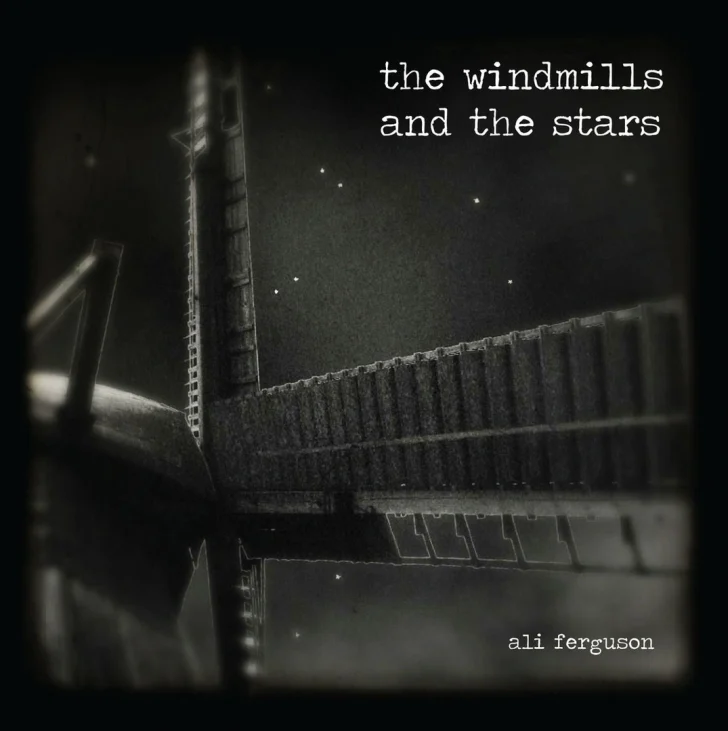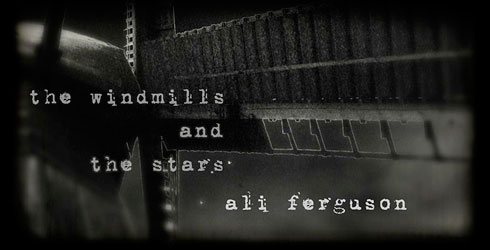- Article
- Read in 10 minutes
Ali Ferguson – The Windmills And The Stars – review
Ali Ferguson, well-known as Ray Wilson’s guitarist, has released his first solo album. Ole Uhtenwoldt has taken a closer look.
Fans have been wondering for a long time if and when Ali Ferguson would release an album of his own. Now they know, for the first solo album of Ray Wilson’s guitarist has come out on May 11, 2011. It is called The Windmills And The Stars. This is our review.
Background
Ali Ferguson is a household name particularly for Ray Wilson fans. He has been a member of Ray’s live band and also appears on his studio records. Concertgoers regularly enthuse about his delicate lead guitar parts, e.g. in Stiltskin shows. Those who have seen him live know that he is a very talented and very able musician. That is a good reason for him to make his own solo album.
The Windmills And The Stars is an accomplished, intelligent, sophisticated album, though the style of music is probably not what Ray Wilson’s audiences would have expected it to be. It does not appear to be a spontaneous album. On the contrary, it seems as if he had spent a lot of time honing the song material. The album has not been released on a (tangible) CD, but you can download it from Ali’s website in various file formats (e.g. mp3). The download comes with a digital booklet that contains beautiful photos and a fitting cover that resembles a sort of blurred mixture of a windmill and a guitar.
The first inkling of how Ali might sound solo appeared on Ray’s 2009 album Propaganda Man: Frequency is the title of the song Ali and Ray wrote together. It has wonderful vocal parts and a very atmospheric guitar solo. Both these elements are also in evidence on The Windmills And The Stars.
The album is a mixture of various rock elements and one of Ali’s personal favourites, ambient music; it also contains beautiful acoustic parts. These elements are, however, not really mixed up but fused together so that it is all of a piece ranging from noteworthy rock songs and various modes of ambient. Some songs have a background of nature sounds, others have classy spoken lyrics. Actually, all eight songs have lyrics, whether they are spoken or sung. Thinking of rap would be as wrong, though, as thinking of Steve Hackett’s Darktown: The spoken word is less regular here and the music underneath it is performed absolutely spot-on so that there is a positive, optimistic mood.
The music and the songs

Ali has all the musicians he needs on the album. There is no drummer, though, because all the drum sounds on the album (as on Steve Hackett’s and Nick Magnus’ recent albums) were programmed. The album is none the worse for it, the drum sounds are actually an asset. Programmed drums have become so sophisticated these days that it is hard to tell them apart from ‘real’ drums. They fit in very well with all the songs. Ali has done not only the programming, but he also plays bass, keyboards and the guitars on the album – and he does a top job at singing with his pleasant and capable voice. He proves it occasionally by performing Pink Floyd’s Wish You Were Here at Ray Wilson concerts. He does all these jobs perfectly. A number of guitar cues on the album have been executed in an excellent way. The other musicians on the album are Liam Saunders, who plays the keyboards, Kim Shepherd for female vocals and Chris Agnew and Lawrie MacMillan on bass. He has been Ray Wilson’s bassist since 2006, doing a great job on Propaganda Man and sundry live performances. The musicians work very well together, and the result of their sessions is very worthwhile listening to.
Hidden Instruments
The album begins with harmonic nature sounds with birds singing happily. ‘Hidden instruments’ begin to emerge from the background. A quiet keyboard blanket and some extra cues cover the nature and Ali begins to recite the lyrics of the songs, lyrics in which he appears to describe the song itself urging us to listen. Other instruments slowly join in as the song builds, become tighter and more rhythmic. Drums with a mechanical sound and electric guitars that determine the speed move ahead along with the lyrics. This way of presenting lyrics is rather unusual but is it enjoyable to listen to. The musical background is tailored to Ali’s voice, too. Finally he tells himself to „stop the words now“ and instrumental fireworks begin. The electric guitars close in on each other in an incredibly atmospheric and tight way, bombastic drums come in and the keyboards add dynamism to the whole song. It is a very melodic track with outstanding guitar work; amazing how the instruments seem to meld into each other. The drums provide an ending, a brief passage of the lyrics is repeated before the song drifts away in weird, distorted sounds until the only thing left are the nature sounds from the beginning. A very strong and masterly opener with a fine structure, it showcases Ali’s capability. This song illustrates one of the things Ali mentions in the lyrics: „We have fallen into the place where everything is music.“ We have indeed.
Coincidence Is No Accident
The second song begins quieter. Calm keyboad sounds lead into the song before drums come in and keep the pace. Ali sings very expressive, the verses are full of feeling and seem, though they are not, very fragile. The bass fits in well with the overall picture. The chorus is an emotional high on the album with great support by the electric guitars. A brief guitar solo follows after the second chorus, and then the chorus is repeated in a distorted voice. The single elements fade out one by one towards the end of the song until there are only the keyboards and an acoustic guitar left to spread a mood that somehow reminds the reviewer of a wintry sky. With these sounds the song ends on a thoughtful note.
Despite the subdued mood the overall impression is one of optimism. Ali manages to create this particular feeling of encouragement we also know from other artists in the Genesis camp, e.g. Peter Gabriel. The deep lyrics show just how good a singer Ali is.

A Child’s Song
Calm keyboards and nature sounds lead into a song that sounds like a quiet evening. The acoustic guitar introduces a beautiful melody that is dramatic and soothing at the same time. Ali restricts his vocals (with a doubled voice) to two passages; the gentle lyrics are quite brief and make up the core of the song. It is evident that Ali sings about a crying child he tries to soothe. The solo on the electric guitar after the vocal part is quite emotional and a bit depressing. It moves on seamlessly into an acoustic solo – an excellent example that shows how proficient Ali is in the transition from acoustic to electric guitars and vice versa. The song calms down and becomes quieter before it finally ends with something that sounds like a musical box. A delicate track in which the acoustic guitars in particular enhance the general mood of the song.
Flickering Golden
If you think that this classy title indicates a classy song you would not be wrong at all. There is a marked contrast to the previous songs. The mood has become more relaxed, more at ease, the verses are full of the joy of life and the chorus is rocky, not least because of the brilliant guitars. Ali shows that he can do rock, too. The chorus is repeated several times; the final repetition uses the distorted voice again. A brief instrumental outro follows, hardly a solo. At a little under five minutes this is the shortest track on the album, and that’s good. It is not unnecessarily drawn out and preserves the original song idea.
Note the very strong bass in the outro and the peculiar scratching sounds with which this spectacle ends. It is a less obtrusive song on the album, but do not underestimate it… it may be the secret favourite.
Awakening (The Stars)
It is night. Crickets are chirping, a train can be heard. A very inspiring, unique soundscape. Kim Shepherd’s voice, the driving force of this song, tells us she sits in a car, looks at all the nature around her and talks about her life. Gentle guitar chords complete the picture and towards the ends there are some keyboards like a starry night sky. The intriguing thing about the song is that nothing much happens, everything remains on one level, and there is only a slight heightening towards the end. But all this has that special something. It is the golden middle for the album. None of the other songs could follow the bombastic sound of the previous song like this one. It is terrific to see how a trivial song idea develops into something that really speaks for itself. It is more complex than you would think, and once the lead guitar comes in it sounds as majestic as some of the things Pink Floyd did.
In Morning Sky
Ali keeps up the concept, for the soundscape feels like morning. Well, the title gives that away. As if it was a radio play you can hear someone come in, grab the acoustic guitar and take a breath. A guitar melody begins, sober, yet emotional, very fitting for the song – and top of the line. The lyrics about the morning are performed as good as one has come to expect. Kim Shepherd’s backing vocals are top notch, too. If you listen very closely you can also hear a TV set in the background. After two verses there is a different vocal part with very impressive piano. Now piano is not really rare on this album, but it comes in just the right way in just the right moment. What follows is simply terrific: Ali treats us to what is probably the best guitar bit on the whole album: Various solos alternate between electric and acoustic guitar, and they are the highpoint of the album. This unique finale becomes the song very well, and these guitar moments are the reason why many fans have been hoping for a solo album for so long. As the song begins to fade out a new element comes in that is known mainly from progessive rock, the organ. It continues the rhythm and gives it a reverent ending.
Bending Bullets, Breaking Falls

A charming song that sounds a bit like a finale. A couple of drum hits, and the acoustic guitar comes in and is followed soon by Ali’s singing. Lovely lyrics describe the silence between people and encourages the listener to fully enjoy every happy moment („live life in slo-mo“). A good rendition of the song idea, and the music is fine, too. Relaxed, funny keys and cool guitars are in the foreground, while Kim Shepherd can be heard singing in the background. Verses and chorus are finely balanced and go very well together. After a brief transitional bridge there is a sensational solo on the electric guitar. The solo builds up to an enormous speed. Sound effects mark the ending of the track. This song is a symbol of the whole album in that it brings together all the good properties of the album: atmosphere, dynamism, liveliness. It is the reviewer’s favourite.
The Windmills
The title song begins like several of the songs tracks, only more serious and less playful. The nature sounds seem to come from the jungle and there is a sentimental blanket of keyboard sounds. Ali quietly sings brief, thoughtful lyrics in a distorted voice. Then he plays a dreamy, expressive and slow solo accompanied by the keyboard. This grows more quiet after a while, but in a stroke of genius he does not end the song. Indian sounds introduce a bit of world music. When it fades away the only sound you can hear is a ‘windmill effect’ that ends suddenly and leaves only the wind. This guitar anthem marks the perfect ending for a very accomplished album.
All in all
What we have here is an album that does not simply begin and end again but leaves a lasting impression. Ali has created a most impressive body of music, and you will be surprised to find out how really good it sounds. It is the reviewer’s insider tip. Impressive that he has found time for a solo album between all the concerts and Stiltskin sessions.
There are so many good things about the album. The guitars are masterly, the outros are remarkable in that there is not a single fade-out on this album: Every song has its own ending. Ali’s vocals are most professional and top-notch throughout. All the songs are strong and worthy to be on the album. Perhaps a little change of pace here and there would have been good. The diverse sound of the album more than makes up for that, though. The Windmills And The Stars is really up there with other releases from the Genesis camp – perhaps there is room for a sequel.
The Windmills And The Stars is available as a digital album (mp3) straight from Bandcamp, but also from amazonMP3 and iTunes.
by Ole Uhtenwoldt, English by Martin Klinkhardt

